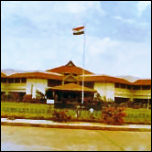
ABOVE: Bharat Dynamics HQ
in Kanchanbagh, India
Late last week, the Bureau of Industry and Security (“BIS”) released documents relating to an agreement by Toll Global Forwarding (USA), Inc. to pay $200,000 to settle charges that it had aided and abetted nine unlicensed exports of EAR99 items to companies on BIS’s Entity List. The company also agreed to conduct an external audit of its export controls compliance program.
The violations at issue were committed by Baltrans Logistics prior to its acquisition by Toll Global Forwarding in 2008. The exports in question were to Bharat Dynamics Ltd. and Solid State Physics Laboratory, both government-owned entities in India which have since been removed from the Entity List.
It is hard to work up much sympathy for companies engaged in this kind of violation by failing to consult an easily accessible list on the BIS website. And in this instance, it wasn’t an isolated failure but instead nine separate failures. Worse yet, this wasn’t Baltrans’s first time at the rodeo. In 2007 Baltrans agreed to pay a $6,000 fine to settle charges of an unlicensed export to another Indian company on the Entity List. Moreover, one of the unlicensed exports in the current case occurred after Baltrans agreed to pay the earlier fine. That might explain the high fine in this case as well as the external audit requirement
 Permalink
Permalink
Copyright © 2011 Clif Burns. All Rights Reserved.
(No republication, syndication or use permitted without my consent.)

 Posted by
Posted by  Category:
Category: 

